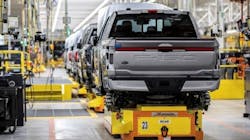A Rough Week for EVs: Ford, Tesla announce setbacks, but maintain optimism
The electric vehicle industry had a rough ride this past week, but most signs still point to a future fast lane of phenomenal growth.
Shortly after it had announced plans for a massive battery manufacturing plant in Michigan, Ford Motor Co. halted production of its most famous EV so far, the F-150 Lightning truck, due to a battery fire problem detected during testing. The company temporarily shut down Lightning production at its Detroit plant.
Meanwhile, industry leader Tesla announced it was recalling some 363,000 vehicles due to safety issues with the self-driving software. The recall covers Tesla’s S, X, 3 and Y models.
According to some news reports, the concerns about Tesla’s software did not come from the company itself but a review by the National Highway Traffic Safety Administration in the U.S.
Ford expects production to be idled at least through next week.
Of course, there are issues which can happen with internal combustion engine models but are rarely as publicized as those in the fledgling e-mobility industry. Skepticism reigns among many outside the industry, wary of the grid's ability to meet future demand as well as solving issues such as range fear and recharging times.
Optimism reigns among EV proponents, of course, as seen by numerous companies announcing new battery manufacturing capacity to ramp up in the U.S.
The latest was Ford’s own announcement earlier this week. The automaker plans to invest $3.5 billion to build a plant assembling lithium iron phosphate (LFP) chemistry batteries at a new plant in Marshall, Michigan.
The company also is investing in U.S. production capacity around nickel cobalt manganese, giving it viable options to the predominant lithium-ion chemistry used in most current EV and utility-scale energy storage.
Mercedes Benz also reported higher than expected earnings of about 5.4 billion Euros, citing sales of electric vehicles rising some 67 percent year over year. EVs are key to German automaker’s future growth plans.
About the Author
Rod Walton, EnergyTech Managing Editor
Managing Editor
For EnergyTech editorial inquiries, please contact Managing Editor Rod Walton at [email protected].
Rod Walton has spent 17 years covering the energy industry as a newspaper and trade journalist. He formerly was energy writer and business editor at the Tulsa World. Later, he spent six years covering the electricity power sector for Pennwell and Clarion Events. He joined Endeavor and EnergyTech in November 2021.
Walton earned his Bachelors degree in journalism from the University of Oklahoma. His career stops include the Moore American, Bartlesville Examiner-Enterprise, Wagoner Tribune and Tulsa World.
EnergyTech is focused on the mission critical and large-scale energy users and their sustainability and resiliency goals. These include the commercial and industrial sectors, as well as the military, universities, data centers and microgrids. The C&I sectors together account for close to 30 percent of greenhouse gas emissions in the U.S.
He was named Managing Editor for Microgrid Knowledge and EnergyTech starting July 1, 2023
Many large-scale energy users such as Fortune 500 companies, and mission-critical users such as military bases, universities, healthcare facilities, public safety and data centers, shifting their energy priorities to reach net-zero carbon goals within the coming decades. These include plans for renewable energy power purchase agreements, but also on-site resiliency projects such as microgrids, combined heat and power, rooftop solar, energy storage, digitalization and building efficiency upgrades.

